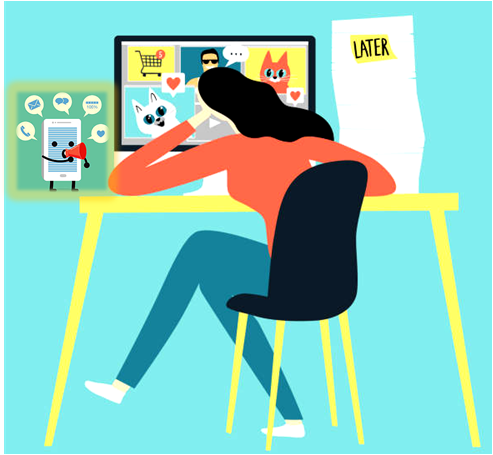Technology: A tool for procrastination
Stop letting technology be cause for distraction, depression, anxiety

Digital distractions are certainly not uncommon. They can be harmful to your study or work habits.
October 14, 2021
Have you ever had a day where you wake up, do your morning routine, have a wholesome breakfast, get that energy on for conquering your to-do list and then end up scrolling through your phone or laptop for the rest of your day?
Are you the person that cannot abstain from checking those notifications as soon as you wake up?
Well … you are not alone.
“Whenever I wake up or go to sleep, I have to use the phone because I just have to check what’s going on. Like, if there are some tournaments going on, how did they score or what’s the current news,” said Abodh Poudyal, second-year electrical engineering graduate student.
We are presented with distractions in every digital form — laptop, iPad, phones, smart watches, computers, TVs. The list goes on. How could you not be distracted by one or the other at any moment?
A recent study conducted by Gloria Mack, lead researcher at the University of California Irvine showed that, “an average person is distracted or interrupted every 40 seconds when working in front of a computer.”
How much can you really get done with a focus time of 40 seconds?
“I have to put my phone on silent or like Do Not Disturb mode if I really want to hunker down and focus so that I don’t allow any like text messages to pop up,” said Claire Adams, second-year material science engineering graduate student.
For an average person, it takes 23 minutes and 15 seconds to return to the original task after an interruption, according to the study.
So, whatever time you set yourself to be distracted (say a 10-minute break on YouTube) is actually your break time plus the 23 minutes and 15 seconds.
The real concern here is we are letting these digital devices distract us from normal functioning when they were invented to support our daily lives.
“Whenever my phone is misplaced somewhere, I immediately look for it. I cannot leave it somewhere for even an hour maybe; I just need to know where it is exactly,” Poudyal said.
Even the tiniest distraction can derail your productivity. I am not talking about just schoolwork or research productivity.
When was the last time you left piles of laundry to sit around your apartment to watch Netflix? How many times did you end up eating fast food while scrolling through those healthy meal prep posts on Instagram?
Are we really letting ourselves use digital distractions as a tool to procrastinate our daily activities, or do we procrastinate because we are distracted?
“I struggle with the idea of stalling — like I have something to do, but then I will be like I can be on my phone for a little bit more, and I can just do this task like in an hour from now. I just keep dragging it out, and I don’t really complete it,” Adams said.
I think it is very important to acknowledge that digital distraction is indeed a problem in our lives, especially as students.
The good news is we can tame our distractions for a more productive lifestyle.
Research suggests that being lazy, aka not doing anything and having more time for solitude, is when we are actually more creative.
There are many ways to deal with distractions: going cold-turkey and deleting all your inessential or distracting apps, embracing technology to set time limits on your apps, checking your digital content only few minutes in a day, etc.
“I don’t believe that I’ve been all this overwhelmed with social media apps. So, as of now, I have some control of not overusing it,” Poudyal said.
Like Poudyal, if you believe you can control your digital usage, you can be sure you have a good relationship with your technology.
But if you think it is a problem like Adams and the rest of us, ask yourself if you want to go on a digital declutter. Can you go without all inessential apps and digital distractions for a short period of time?
One way to do that is to find an accountability partner and choose a few activities you’ll replace those distractions with — like reading more, learning an instrument, connecting with friends and family, being lazy and being in solitude.
There is a ton of research out there to experiment with in terms of taming your distractions. Practice a few and see what works the best for you.
“I literally schedule everything in my day, from like the time for my breakfast to the time that I have to do work for my classes to like making dinner, I will schedule it all,” Adams said.
At the end of the day, we want to establish a healthy relationship with our technology. There was a reason it was invented — that is if you believe humans are not actually dumb.
Technology does not need to be a source of distraction, depression or anxiety. It does not need to be bigger than us. It can always be that wonderful tool to enhance your daily life if you choose for it to be.








